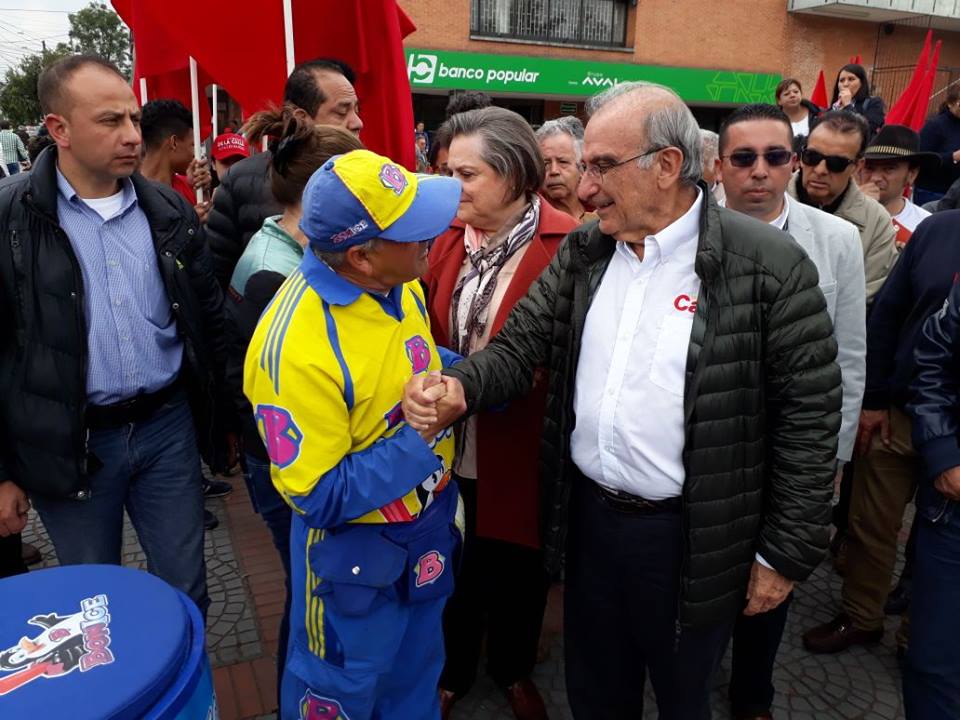@radiobrendan
OK, we may need to change our preference. While we still have plenty of respect for V.E. Blanco, the sad reality is, for, um, existential reasons he won’t actually physically make it to Palacio de Nariño, Colombia’s presidential palace.
That being so, you still have to admire his performance ahead of the presidential first-round vote on 27 May. He’s doing better than four of the seven actual candidates in the race. Only Iván Duque, Gustavo Petro and Sergio Fajardo (just about) are more popular according to the opinion polls.


De la Calle: As his name suggests, he’s right at home on the streets. (Photo from Facebook.)
To the left, to the right
Yet, taking Dr Blanco out of things, who do we endorse for Colombia’s top job? For many locals it’s either the rightist Duque, the candidate of former president, the divisive Álvaro Uribe, or former Bogotá mayor and once leftist guerrilla with the defunct M-19, Petro. The never-again-to-be-trusted opinion polls have Duque ahead, a man who has promised to make significant adjustments to the peace agreement outgoing President Juan Manuel Santos signed with the Farc.
In many ways it would be interesting to see how Colombia would operate under a leftist president, something it has never really had. Now how left Petro actually is depends on who you listen to. He talks a somewhat leftist game in any case, yet he certainly doesn’t dress like a man at one with the impoverished masses.
For sure, all candidates realise the need to address the vast inequality Colombia has, and have various ideas in this regard. Yet proposals on paper are one thing, putting them into practice quite another. Needless to say there’s no simple solution.
Fajardo the Fair
Notwithstanding that, considering Duque-Petro is seen as a battle of the extremes — «A hawkish Duque presidency will result in deepening political and social division, a Petro administration will see the country slide towards socialism and potentially cripple the economy» — more moderate Colombians are looking for the centre ground. On this front, former Medellín mayor and Antioquia department governor Fajardo appears to be the preferred candidate.
He’s promising to be a «president of reconciliation», playing in a way to that concern that a win for either of the current leading candidates will dangerously divide the country.
Of course, he’s not the only centrist candidate. However, the polls have him comfortably ahead of both Germán Vargas Lleras, who had a stint as vice president under Santos, and the Liberal party’s Humberto de la Calle, whose last political role was government chief negotiator in the Farc peace talks.
That the two men had important posts in the Santos administration is no doubt working against them. The electorate is looking for change and both Vargas Lleras and de la Calle have been too close to the outgoing crowd.
De la Calle: The stopgap president?
Yet, the country could do worse than taking stock of things after a few rocky years. For one, there’s been that aforementioned controversial peace agreement which ended up being rejected in a referendum yet its implementation went ahead anyway. We’ve also seemingly never-ending corruption scandals and the delicate issue of streams of Venezuelans continuing to enter the country as they escape the mess they have at home.
In such an environment, an experienced, largely respected pair of hands in the shape of Humberto de la Calle could be seen as a good compromise, interim choice.
At almost 72 years of age and with his moderate background, he’s not exactly in the same mould as a Putin or Uribe. A ‘president for life’ by whatever means possible he will not be.
He’s unlikely to dramatically change things, for better or for worse. However, at a time where the tendency across the globe seems to be to run to the extremes, de la Calle offers Colombia a little breather from the madness, and maybe even a bit more.
Humberto de la Calle: Steady as she goes for four short years?
______________________________________________________
Facebook: Wrong Way Corrigan – The Blog & IQuiz «The Bogotá Pub Quiz».
